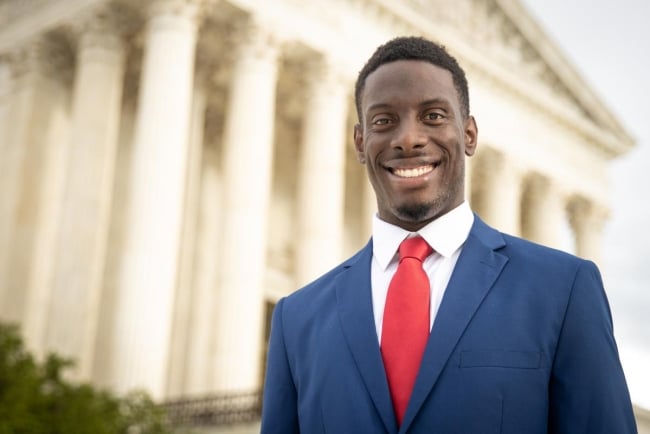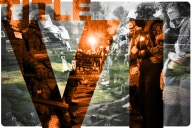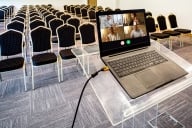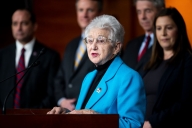You have /5 articles left.
Sign up for a free account or log in.

Chike Uzuegbunam outside the U.S. Supreme Court in Washington, D.C.
Courtesy of Alliance Defending Freedom
The Supreme Court ruled 8 to 1 Monday in favor of two former Georgia Gwinnett College students who sued the public institution over restrictive campus speech policies.
In Uzuegbunam v. Preczewski, the court held that the students had valid claims for nominal, or symbolic, damages to keep the case alive and save the case from being made moot by the students' graduation and the college's revision of its policies.
Free speech groups, including the American Civil Liberties Union and the Foundation for Individual Rights in Education, as well as a number of organizations focused on religious liberty, had filed briefs supporting the students' case.
“The Supreme Court got it right,” Darpana Sheth, vice president of litigation for FIRE, a group that opposes restrictive speech policies on campuses, said in a written statement. “Today's ruling protects students’ ability to vindicate their priceless First Amendment rights and hold public university officials accountable. As FIRE's two decades of firsthand experience shows, public colleges and universities across the country routinely infringe student speech rights but can escape accountability by relying on a student's impending graduation or otherwise mooting the case by changing the policy after a lawsuit is filed. The ruling correctly recognizes that these violations impose real harm, even if the silenced student cannot quantify that harm in economic terms.”
The case involves Chike Uzuegbunam, a former Georgia Gwinnett College student who was twice stopped by campus police from sharing his religious views with fellow students. According to the complaint, a campus police officer stopped Uzuegbunam in 2016 when he attempted to hand out religious literature at an outdoor plaza on campus outside the library, telling him that campus policy prohibited distributing written religious materials in that area. Uzuegbunam complied with the officer’s order and subsequently visited the director of the college’s Office of Student Integrity, who informed him that he could only speak about his religion or distribute materials in one of two designated “free speech expression areas.” He was also told he would need to apply for and receive a permit to use one of the free expression zones, which together comprised about 0.0015 percent of the campus grounds.
Uzuegbunam applied for and received the necessary permit. But he was again stopped from speaking by another campus police officer, who told him students had complained. He was told that campus policy prohibited using the free speech zone to say anything that "disturbs the peace and/or comfort of person(s)" and threatened with disciplinary action if he persisted. Another student, Joseph Bradford, said he decided not to speak as a result of what happened to Uzuegbunam.
The students sued Georgia Gwinnett College, alleging that the policies violated the First Amendment. Georgia Gwinnett initially defended the policy, asserting that Uzuegbunam’s discussion of religion “arguably rose to the level of ‘fighting words.’” But the college ultimately dropped its defense and eliminated the restrictive policies. That rendered the students’ request for injunctive relief moot, but left the question of whether the case could proceed based on the students’ request for nominal damages.
The Supreme Court held that it could. “For purposes of this appeal, it is undisputed that Uzuegbunam experienced a completed violation of his constitutional rights when respondents enforced their speech policies against him,” Justice Clarence Thomas, a conservative, wrote in a majority opinion that largely united members of the court’s liberal and conservative wings. "Because ‘every violation [of a right] imports damage,’ … nominal damages can redress Uzuegbunam’s injury even if he cannot or chooses not to quantify that harm in economic terms.”
"We wholeheartedly agree with the court's ruling that the government cannot violate our rights and then walk away from victims without redressing the very real harm that they cause," said Kristen Waggoner, general counsel for Alliance Defending Freedom, a Christian nonprofit that advocates for religious liberty and other issues. Waggoner represented the students in arguments before the Supreme Court.
"Victims do not receive nominal damages because the violations mean so little; they receive those damages because the violation means so much," Waggoner said.
The students had argued in their brief to the court that without the ability to press their case to seek nominal damages, they would not be redressed for the constitutional injuries they suffered. Further, they argued, "holding that a nominal-damages claim is insufficient to continue a case or controversy eliminates any possibility for an attorney-fee award … This would deter litigants and attorneys from pursuing constitutional claims that lack a compensatory damages component, expanding opportunities for government officials to violate constitutional rights."
The court decision did not directly address the issue of attorney-fee awards. "Our expectation would be that the rule that has been in place would continue and the majority of the court's decision didn't say anything suggesting otherwise," said Waggoner. "The rule is that if you prevail and demonstrate that there's been a violation of your rights, you're entitled to attorney fees under the law."
Kevin King, an attorney with the Washington-based firm of Covington & Burling who was involved in preparing amici briefs in the case, said the ruling is especially important because of certain factual patterns in these kinds of cases. "Students often graduate by the time a case is fully litigated, and violations of their civil rights often do not cause readily ascertainable economic harm, meaning that for many of these student plaintiffs, nominal damages are the only option on the table," King said. "Today’s ruling from the Supreme Court ensures that those student plaintiffs can have their day in court."
King added that the court's ruling leaves a critical question unanswered: "The court puts off for another day the related question of whether the defendant facing one of these $1 claims can simply pay $1 to the plaintiff or another party and end the case without admitting liability," he said.
Chief Justice John Roberts, the lone justice dissenting from the majority, addressed such a possibility in his dissenting opinion, suggesting that in cases where a plaintiff asks only for a dollar, “the defendant should be able to end the case by giving him a dollar, without the court needing to pass on the merits of the plaintiff’s claims.”
More broadly, Justice Roberts worried that the decision "risks a major expansion of the judicial role."
"Until now, we have said that federal courts can review the legality of policies and actions only as a necessary incident to resolving real disputes," he wrote. "Going forward, the judiciary will be required to perform this function whenever a plaintiff asks for a dollar. For those who want to know if their rights have been violated, the least dangerous branch will become the least expensive source of legal advice."
A spokeswoman for the Georgia Office of the Attorney General, which defended the case, declined to comment.








